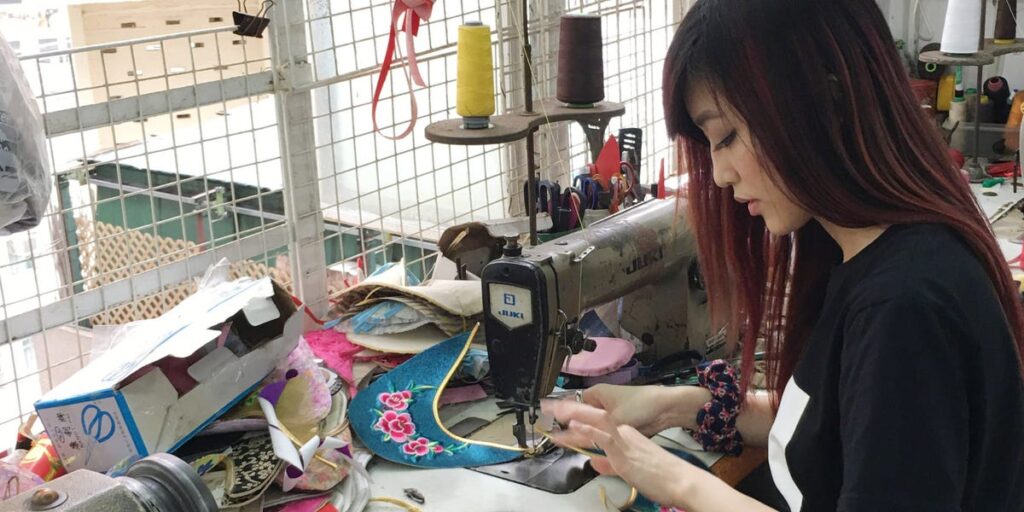- Mil Wong, 33, grew up in Hong Kong with her grandparents and helped out in her family's shoe manufacturing business.
- For her final year university project, she worked on rebranding her family business.
- She is now the third generation owner and is determined to keep the declining business alive.
While working on her final year project at the Hong Kong Polytechnic University, Mil Wong realised what she wanted to be when she grew up.
For this project, the visual communication design student developed a proposal to rebrand her family's shoe manufacturing shop, Sindart, which her grandfather opened in 1958 to make and sell traditional hand-embroidered slippers.
“My plan was to rebrand the store by improving the old patterns and functionality of the products, adding new designs, and promoting the knowledge and traditional craftsmanship of embroidered shoes,” she told Business Insider.
Her plans included expanding her product range, hosting workshops and promoting her brand. She said she has sadly seen the craft become one of Hong Kong's disappearing industries.
“At first I didn't intend to join the family business, but after I made a business plan I realised I wanted to continue with it,” she said.
She started her shop at age 22 after earning her bachelor's degree. Staying true to her grandfather's vision of offering affordable options, Wong keeps prices reasonable: the cheapest shoes are priced at HK$99 (US$12) without any embroidery; for more intricately decorated shoes, prices rise to around HK$300 (US$38).
Wong said most of the materials – nylon, silk, satin and brocade – are sourced from Hong Kong, Japan and Europe, and the store sells between 80 and 100 pairs of shoes a week.
But Wong, now 33 and the shop's third-generation owner, was forced to make changes. Here's what she's focused on over the past decade to keep the shop afloat:
new
“It is important to continually improve the design, functionality and aesthetics of our products to remain relevant and attractive to consumers while preserving our core traditional skills,” she said.
Since taking over, she has focused on injecting new energy into the business, introducing new designs, such as recreating the popular panda in different colours, to attract a younger generation, while also respecting the legacy of her late grandfather by preserving many of his timeless and original designs.
“My grandfather used to make only indoor slippers,” she says. “So after I graduated from college, I wanted to make more designs for the outdoors, and at the same time expand the collection to offer wedding styles and casual styles for everyday wear.” Today, the brand has about 300 designs, including some from her grandfather.
Technology transfer
Wong said he has noticed a renewed interest in artisanal, bespoke products across Hong Kong, with workshops, demonstrations and exhibitions helping to spread the word.
Some believe more could be done to preserve skills in Hong Kong. “Experienced shoemakers should be encouraged to pass on their skills to the younger generation through apprenticeships,” Dr Erin Cho, professor at the School of Fashion and Textiles at the Hong Kong Polytechnic University, told BI. “Educational institutions could also offer courses in shoemaking and footwear design to raise interest in the shoemaker's craft.”
Reach a wider area
Social media has played a big role in promoting Wong's business: She has 26,000 followers on Instagram, where she engages with fans by offering shoe-styling advice and sharing behind-the-scenes videos that show the intricate process of making her delicate shoes.
“My clients want to know how to wear their shoes and how they will work with their outfits,” she said.
Passion is key
Training and guidance are necessary to safeguard the long-term sustainability of traditional crafts. “This is a very special industry that combines two crafts: handmade Chinese embroidery and shoemaking,” says Wong. “It's a very precious tradition in Hong Kong and we want to promote this craft as people can learn the meanings hidden in the designs.”
But it's not easy: “Rising labour costs in Hong Kong are making it difficult for traditional shoemakers to maintain profits,” said Prof Cho. What's more, he said, there may also be a shortage of young craftsmen taking up the trade.
Lindsay Verty, author of “Sunset Survivors,” a book about keeping Hong Kong's traditional industries afloat, told BI that a combination of high rents and modern technology replacing these industries is making it difficult.
“But I think the main reason many of these old trades are disappearing is because there is no one willing to take over. Earlier, you followed in your family's footsteps in whatever trade you had, but now no one wants to be a knife sharpener, threader or shoemaker when there are jobs with better hours and wages available to anyone with a school or university education,” Bharti said.
Luckily for Wong's family, that wasn't the case.
As for passing the business on to the fourth generation, Wong is currently unmarried and has no children, and said she would need to assess whether any future children would have the same level of interest in the business as she has. “I'll see if they want to ask me to teach them, because I think they have to be very interested in this craft,” she said, “and if they really want to take over, they have to be very attached to it, like I am.”

